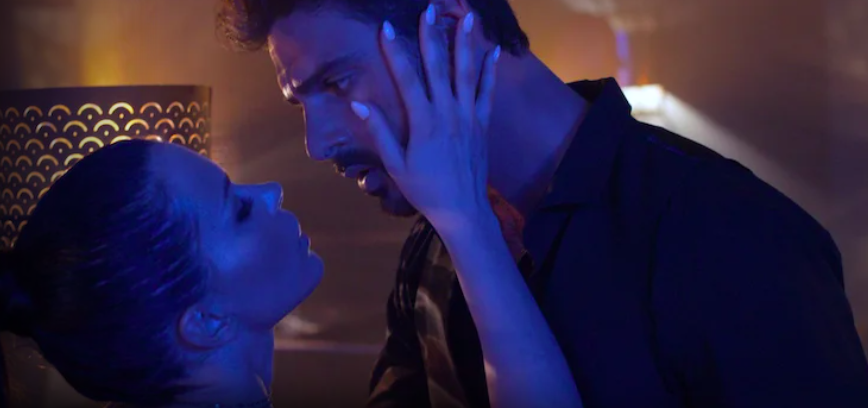Hostage situation lust is not healthy. It’s not sexy, nor is being a man’s prisoner a turn on. Unfortunately, the new Netflix phenomenon 365 DNI didn’t get the memo.
The film has become the number one trending movie on the streaming service and is being dubbed the Polish Fifty Shades of Grey as a result of its racy scenes and displays of BDSM.
The erotic thriller follows Polish woman Laura, who becomes drawn into a relationship with dangerous but (arguably) sexy Massimo, a member of the Sicilian Mafia family, after he kidnaps her while she’s holidaying with her partner.
Despite leaving some viewers a little excitable, it’s hard not to question the basis on which 365 DNI is built: Stockholm Syndrome.
In simple terms, it’s a condition where a captive falls in love with or begins to empathise with their captor, which is what happens to Laura as she’s pulled further into Massimo’s orbit.
One Twitter user brought to light the dark origin story behind the term, highlighting sexism played a big part in how the term came to be, and how it was birthed from a place of misogyny from men in positions of power.
365 DNI’s glamorisation of malefactor power dynamics is not only shockingly executed, but it paints sexual assault, kidnapping, murder and controlling behaviour in a light that screams, “YES, THIS IS THE IDEAL RELATIONSHIP!”.
Sure, shacking up with a male model on his yacht is probably a fantasy for some women. But 365 DNI highlights a serious power imbalance that in reality, should be a warning for us all.
We see Laura become infatuated with Massimo as he entraps her with lavish gifts and getaways, masking the fact that her right to sexual consent is being stripped away from her.
But don’t worry — it’s all very romantic.
Though this film was only released in recent weeks, the romanticised Stockholm Syndrome element of cinema dates back as far as Dracula. Pop culture adopted the term to reference the questionable relationship in Disney’s 1991 Beauty and the Beast.
It’s one of many Disney children’s tales that has not aged well, along with Snow White and Sleeping Beauty, in which the handsome princes make a move on the princesses while they’re unconscious. These days, kissing a comatose woman would be considered sexual assault, especially if we’ve learnt anything about the consequences of the date rape drug.

As children, we were led to believe that these displays of affection were romantic and that women should fall at the feet of attractive men no matter their actions.
If it was an ugly, bald and broke guy forcing himself onto a woman, would we still consider this behaviour flattering?
According to the White Ribbon organisation, one in four young Australians think it’s pretty normal for guys to pressure girls into sex, and that one in four women have experienced emotional abuse by a current or former partner since the age of 15.
Is subjecting kids to films that promote domestic violence, in a way that appears romantic, trying to rationalise abusive behaviour in future relationships?
From Christian Grey to 365 DNI‘s Massimo, it’s becoming more apparent that in theory, hot men committing acts of violence in the name of love is attractive. Netflix is notorious for birthing male characters who get away with murder (literally) and a number of other repulsive acts due to the sole fact that they’re extremely good looking.
The service’s hit show You centres on Joe Goldberg, a psychopath who stalks and worms his way into unsuspecting women’s lives, stopping at nothing to gain their affection (including trapping them in a glass box in the basement of a bookstore). Despite his violent tendencies, fans of the show could not contain their thirst for the handsome stalker, played by Penn Badgley.
Tweets sexualising Ted Bundy also inundated Twitter upon the release of the Netflix biopic Extremely Wicked, Shockingly Evil and Vile, in which Zac Efron played the 70s serial killer.

We can go around in circles and criticise the phenomenon of Stockholm Syndrome in pop culture, as well as the romanticisation of assault and manipulation, but it doesn’t erase the fact that it exists.
The fact that 365 DNI is currently number one on Netflix Australia’s Top 10 list perhaps says more about us as a culture than it does about the content itself. After all, people have enjoyed the abusive romance trope for much longer than 365 days.
But ladies, remember that there is a huge difference between fantasy and reality.
And men, please don’t get any ideas. No woman wants to be kidnapped and made to fall in love with you, no matter how good looking you think you are.
This story was originally published on 5Why.com.au


